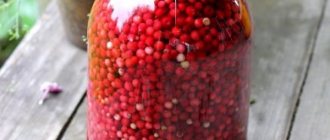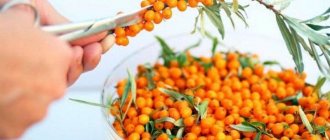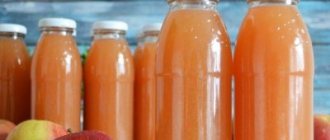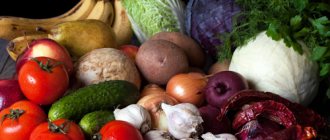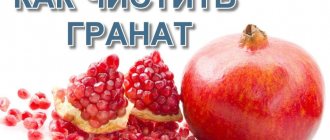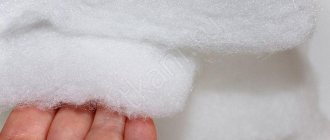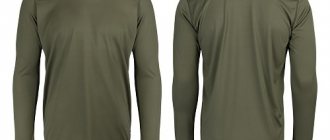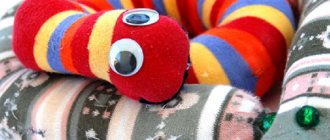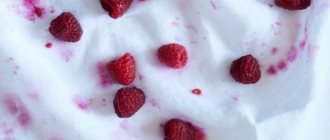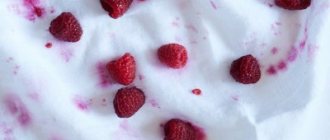I like autumn. Especially when it's drizzling and leaves are falling. At this time, lingonberries are ripening - the beneficial properties of a small but bright (in every sense) berry are unrivaled! For the human body, it is a generous gift from nature, which gives strength and protects against the most dangerous diseases.
The taste of lingonberries is also excellent. Sweet and sour, slightly tart, with a slight pleasant bitterness - this is not a cloying tangerine or watery pitahaya. I could eat it by the bucketful. But it doesn’t grow here in the Krasnodar region...
Vitamins, microelements
The daily portion that will benefit the health of an adult can be no more than 200 g of berries. If you eat this amount of lingonberries, then the daily need for vitamin C will be satisfied by 33.4%.
| Nutritional substance per 100 g of product | Quantity per 100 g | % of the substance in 100 g of berries from the daily norm |
| Low molecular weight organic compounds (vitamins) | ||
| A | 8 mcg | 0,9% |
| IN 1 | 0.01 mg | 0,7% |
| AT 2 | 0.02 mg | 1,1% |
| WITH | 15 mg | 16,7% |
| E | 1 mg | 6,7% |
| RR | 0.3 mg | 1,5% |
| Niacin | 0.2 mg | — |
| Macronutrients | ||
| Potassium | 90 mg | 3,6% |
| Calcium | 25 mg | 2,5% |
| Magnesium | 7 mg | 1,8% |
| Sodium | 7 mg | 0,5% |
| Phosphorus | 16 mg | 2% |
| Microelements | ||
| Iron | 0.4 mg | 2,2% |
Contraindications for consuming lingonberries
No matter how useful lingonberries are, there are also contraindications to its use. It is recommended that people:
- with allergic diseases;
- diseases of the digestive system with increased acidity;
- threat of abortion;
- bleeding (including in the postpartum and postoperative period);
- low blood pressure.
People suffering from diabetes should exclude lingonberry dishes with sugar (jams, fruit drinks, marmalade) from their diet. They are recommended to use fructose and other sweeteners.
Recipes for healthy eating
Cauliflower baked in the oven - dietary recipe
- 6.2 Proteins
- 10.9 Fats
- 22.1 Carbohydrates
- 201.4 kcal
30 min.
- #vegetarian dish
- #second course
- #garnish
- #dietary
- #for vegans
- #baking
- #lemon
- #low calorie
- #dinner
- #vegetables
- #snack
- #vegetable oil
- #soy sauce
- #spices
- #dinner
- #cauliflower
- #garlic
Other recipes
What special elements are there?
Despite the fact that the berry consists of 86% water, it contains many valuable and rare chemicals. Lingonberries contain an abundance of organic acids that are not found in other types of berries. The leaves and fruits contain flavonoids that help strengthen vascular walls. Lycopene in the composition has an antioxidant effect. The seeds consist of 30% fatty oil. The oil component also contains glycerol esters and fatty acids.
Tannins
The berry grows in conditions of good lighting and in moist soil, so the above-ground parts of this plant tend to accumulate tannins. Lingonberry tanning chemical compounds bind heavy metals together and remove them from the body. Thanks to organic compounds, the berries and leaves have an astringent taste.
Carotene
The substance carotene is a provitamin of vitamin A - a yellow-orange pigment and an alkene from the group of carotenoids. In terms of the amount of carotene, the berry is superior to blueberries, cranberries, apples and carrots.
Arbutin
The structure of this bitter substance is highly soluble in hot liquid. Arbutin in large quantities is usually found in lingonberry leaves up to 9%. The substance is an antiseptic and on its basis medications are made for the treatment of diseases of the urinary system.
Hydroquinone
The fruits and leaves are rich in arbutin, which breaks down into sugar and hydroquinone in the human body. Hydroquinone has pronounced bactericidal properties, prevents stagnation of urine and promotes the excretion of uric acid.
Acids
The presence of acids in the berry is about 2%. Lingonberry seeds contain linoleic and linolenic acids. Berry pulp contains acids such as: oxalic, acetic, citric, malic. Additionally, lingonberries contain acidic compounds:
- benzoin;
- A-ketoglutaric;
- pyruvic;
- glyoxyl.
Lingonberry leaves contain organic substances with acidic properties:
- wine;
- ursolic;
- cinchona;
- ellagic;
- gall.
Phenologlycosides
In medicine, lingonberry leaves are used to treat the kidneys, genitourinary system, rheumatism and arthritis. The phenolic compounds of this plant have an antiseptic effect. Also, a decoction of the leaves is a choleretic agent.
Who can eat lingonberries?
Each product is unique in its effect on the human body. To achieve maximum sports results, optimal plant raw materials (leaves, berries) are selected. But this is not enough. It is necessary to correctly take into account the phases of the training period. And the most important thing is to find out the characteristics of the body itself: gender, age, type of sport. Let's consider the effect of lingonberries on different athletes.
For athletes
As a tonic and strengthening agent, lingonberries are useful for representatives of all sports. This plant is of particular value during the period of weight loss, after injuries with limited mobility, and when returning to training after childbirth.
Let's look at the main types of lingonberry diet:
- Three days. It combines low-calorie (0.1%) kefir and berries. During the day, in any combination, it is permissible to eat about 0.5-0.7 kg of lingonberries and drink 1.5 liters of kefir. Berries are eaten raw, boiled, baked, soaked, etc. Fruit drinks, smoothies, and compotes without added sugar are prepared from them. With such a diet, weight is reduced by 3-4 kg and does not return due to the removal of excess fluid from the athlete’s body.
- Seven days. In this version of the diet, an egg, non-starchy vegetables (fresh or boiled), and basic porridge with water are added to lingonberries and kefir (0.1%). Sugar, baked goods, meat, fish, other fruits and berries (especially sweet ones) are excluded from the athlete’s menu. This diet is more comfortable and easier to follow, and a result of 3-4 kg is achieved after 7 days of diet restriction.
- Supportive. This method of weight loss is used after a three-day or seven-day method. It maintains the achieved effect. On this day, lingonberries are eaten with 0.1% kefir.
- Unloading. This is a one-day diet in which you drink a decoction of lingonberry leaves without restrictions. It is especially useful for athletes with a tendency to increase blood pressure and swelling of the legs.
© rezkrr — depositphotos.com
For women
It is difficult to overestimate the benefits of lingonberries for women. Fans of a healthy lifestyle actively use it as a dessert or the basis for vitamin drinks. Let's consider the periods of a woman's life in which lingonberries are especially useful:
- Autumn-winter period . Lingonberry fruit drinks, compotes, decoctions actively stimulate the immune system. They reduce the likelihood of missing workouts due to colds and stimulate the overall tone of the body. This increases the effectiveness of sports activities against the backdrop of decreasing daylight hours.
- Menstrual irregularities . An increase in physical activity is often accompanied by pain in the lower abdomen, a change in the duration and intensity of discharge. Lingonberry normalizes menstrual cycles and reduces the likelihood of PMS.
- Anemia . Female athletes experience a decrease in hemoglobin levels due to overexertion, heavy menstrual bleeding and an unbalanced diet. Lingonberry stimulates the production of red blood cells, which is especially important during recovery and before prolonged intense exercise.
- Pregnancy . The period of bearing a child is accompanied by a natural decrease in immunity. Adherents of a healthy lifestyle appreciated the ability of lingonberries to resist colds at this crucial moment.
- Lactation . Lingonberries enrich mother's milk with vitamins and microelements necessary for the proper growth and development of the child. At the same time, the outflow of milk from the ducts improves, which prevents engorgement and inflammation of the mammary glands.
- Weight loss . The extra pounds gained after pregnancy can be easily eliminated by the lingonberry-kefir diet. The diuretic effect of the plant reduces swelling without loss of microelements. The diet is selected taking into account the initial and desired weight indicators.
For children
Lingonberries are a storehouse of nutrients necessary for young champions. It supplies their body with vitamins, microelements and other essential compounds. The beneficial properties of lingonberries help the child’s body adapt to temperature fluctuations and physical activity.
When exercising in the pool or outdoors in winter, the leaves and fruits of the plant prevent the occurrence of infectious diseases, especially of the urinary system.
For children whose sports success is directly related to endurance (long-distance running, swimming, cycling, football, etc.), the plant’s ability to improve hematopoiesis is especially important.
Lingonberry intake begins from the second year of life in the absence of contraindications.
Children love dishes made from this delicious berry. For lightweight athletes, it stimulates appetite well.
Admission rules
The healthiest way to eat lingonberries is fresh.
It is recommended to eat no more than 250-400 grams of berries per day.
There are no contraindications for eating lingonberries in the morning on an empty stomach.
Before going to bed, you should limit your intake due to the possibility of overloading the digestive system and causing problems with sleep.
You can prepare a lot of dishes based on lingonberries: yoghurts, smoothies, cocktails, syrups, as well as juices, fruit drinks, teas and compotes. The berry goes well with honey and dairy products.
Leaves, flowers and branches of lingonberry are used to prepare medicinal teas, decoctions and tinctures.
Lingonberry in folk medicine
The berries, leaves, and twigs of the plant are used for medicinal purposes. It is a popular folk remedy for gout, rheumatism, kidney stones and stomach problems.
The benefits of lingonberries for human health have long been noted . It improves digestion, fights viruses, stops bleeding and tones the nervous system.
The berry also helps preserve vision, improves immunity and is an excellent prevention of colds.
It is especially useful for the urinary system: it disinfects and increases diuresis. When used externally, lingonberry juice accelerates wound healing and relieves scabies and stomatitis.
Teas, fruit drinks, and lingonberry decoctions are taken for loss of strength, colds, and migraines.
Use of lingonberries in cooking
Before use, remove leaves, twigs, remnants of moss and lichens, as well as spoiled berries that have changed color. Then place in a colander and wash under the tap. After this, let the water drain.
Jelly, compotes, and fruit drinks are prepared from fresh and frozen berries. They are dried. Jam is made from them. I like to grind it with sugar. “Cold jam” can be stored for up to a year. It’s convenient to take it from the refrigerator, dilute a spoonful in a glass of warm water - and the healthy drink is ready!
In Scandinavian countries, lingonberry sauce for meat and jam are popular. It is eaten with toast and spread on crackers. In Russia they make soaked lingonberries, which can be stored for a long time. It is also added when sauerkraut is sauerkraut.
The lingonberry water that Pushkin mentioned in Eugene Onegin is not alcohol at all, as many authors claim. This is the pinkish liquid that remains after the berries have been soaked - fermented and very healthy, a traditional soft drink and homemade anti-scorbutic remedy.
They put a waxed one on the table
Jug with lingonberry water
In the Larins' house, it was served along with jam on saucers, and not as an appetizer. This completely refutes the opinion of lingonberry water as alcohol. The drink works as a mild laxative. I think that’s why Onegin said: “I’m afraid lingonberry water wouldn’t do me any harm.”
Low-alcohol drinks were also prepared using lingonberries. But it was a mash or liqueur, which was called lingonberry.
The berry goes well with meat products. Sauces and gravies are prepared on its basis. Dried fruits are added to baked goods instead of raisins and used in stewing beef, lamb, and pork.
How to preserve fresh lingonberries for a long time?
Usually it is kept in the cold or in a glass jar filled with cold water, which is exposed to the cold. In this form it will last until next summer, retaining its taste and benefits. With this I say goodbye. I advise you to hurry up and stock up if you sell lingonberries - the beneficial properties for the human body are simply off the charts. This is a powerful healing agent of natural origin, a valuable assistant for the normal functioning of the liver and kidneys. Sweet and sour fruits support the proper functioning of the immune system, strengthen the cardiovascular system and protect against infections.
For children
If your child has a poor appetite, and it takes all your time, energy and reserves of imagination to feed him, lingonberries will become your indispensable assistant. It increases appetite, and at the same time increases the body's defenses and immunity of your baby.
Reference. In folk medicine, berries are used to prevent and treat colds and a tendency to constipation and intestinal obstruction in children. If you have kidney problems, you can benefit from a decoction based on lingonberry leaves, which can be given even to children under one year of age.
How to cook lingonberries - recipes for drinks and dishes
The most traditional way to consume lingonberries is pureed with sugar or honey. Well, if you want to experiment, we suggest you familiarize yourself with interesting recipes.
Decoction of leaves
The decoction can only be used after consulting a doctor, because an overdose is dangerous to health.
Indications for use are as follows:
- cystitis;
- pyelonephritis;
- urethritis;
- urolithiasis disease.
To prepare a decoction, add 2 tablespoons of dried leaves to 200 ml of water at room temperature. Leave in a water bath for half an hour, then strain. Dilute the resulting liquid with 200 ml of boiled water. Take 1/3 cup 3 times a day.
Berry juice
Lingonberry juice perfectly quenches thirst, tones the body and has an antipyretic effect. To prepare it you will need 3 components:
- 200 g berries;
- 2 tbsp. spoons of sugar;
- 2 liters of water.
Mash the lingonberries with a masher until they become a paste. Boil the water. Add berries, sugar and cook for 2-3 minutes. Let the drink brew for 2 hours, then strain. Drink chilled.
Soaked lingonberries
Pickled lingonberries are a delicious appetizer for meat dishes, especially game.
To make the preparation, prepare the following products:
- fruits – 1 kg;
- water – 500 ml;
- sugar – 2 tbsp. spoons;
- salt – 2 teaspoons;
- cinnamon – 2 sticks;
- cloves and peppercorns.
Sort the fruits, rinse under running water and dry on a paper towel. Fill glass jars ¾ full with them.
Then prepare the “marinade”: boil water, add spices, stir and cool.
Pour liquid over berries. Cover the jars with gauze and leave to set at room temperature for 2-3 days. Then close the containers with nylon lids and place in a cool place.
Fresh berries in sugar
This harvesting method allows you to preserve the product until spring. Sort the berries, rinse thoroughly and dry. Place lingonberries in layers in sterilized glass jars, sprinkling with sugar. Shake the containers so that the berries are compacted better. Cover the top with a 2 cm thick layer of sugar. Close the jars with nylon lids and store the lingonberries in the refrigerator.
We recommend: If you grate the cheese this way, it will not stick together and spread on the plate
Lingonberry-pear jam
Jam can be consumed as an independent dessert or used as a filling for baked goods.
For cooking you will need the following products:
- berries – 1 kg;
- pears – 1 kg;
- sugar – 1.5 kg;
- water – 600 ml.
Sort and wash the lingonberries. Pour boiling water over and leave for 3 minutes, then drain in a colander. Prepare the pears: peel, core and pit, cut into small pieces.
Add sugar to water and bring to a boil. Then add lingonberries and pears and cook for 2-3 minutes. Remove from heat and let steep for 2 hours. Then put the pears and lingonberries back on the stove, bring to a boil and cook for another 10 minutes. Pour the jam into glass containers and roll up.
Lingonberry sauce
Lingonberry sauce has a piquant taste with spicy notes. It complements red meat dishes well (pork, beef, lamb, horse meat). To prepare it, mix the following ingredients in a saucepan:
- berries – 400-500 g;
- vinegar (preferably apple) – 0.5 cups;
- sugar – 0.5 cups;
- cinnamon powder – 0.5 teaspoon;
- cloves – 5 pcs.;
- thyme – 1 sprig.
Bring to a boil, reduce heat and simmer the mixture for 30 minutes. Then remove the spices and pour the sauce into sterilized jars. Seal with nylon lids and store in a cool place.
Lingonberry: what kind of berry is it?
These are the edible fruits of a small shrub 20-25 cm high from the Heather family. Lingonberries are a close relative of blueberries and blueberries. It has dense evergreen leaves, and the fruits are small, up to 5-7 mm in diameter. The berries are multi-seeded, bright red, glossy, and have a regular spherical shape. They are smaller and sweeter than cranberries. They ripen in early September. Dense, sour in taste, but after the first frost they become soft and sweetish like viburnum.
In terms of natural reserves, the berry ranks first among wild ones. And in terms of volume of preparations it takes second place after cranberries. It is very productive, yielding up to 300 kg per hectare. It is collected in the forests of the Vladimir, Arkhangelsk, Leningrad regions, Karelia, Sakhalin and Kamchatka.
Ancient writers did not mention lingonberries. The Latin name Vaccinium vitis Idaea translates to “cow vine of Mount Ida.” According to legend, Zeus was born at its peak. But that’s why “cow” is a mystery.
Lingonberries love regions with harsh winters, cool summers - coniferous or cedar forests, peat bogs... They bring them to us from the Urals. This happens rarely. Even in season, you need to “hunt” for it in the market. Yesterday I was lucky enough to find it, and I took a kilogram.
The first cultivation experience in Russia dates back to 1745. The decree of Elizaveta Petrovna Romanova has been preserved, where she orders that lingonberries be planted in Peterhof instead of boxwood, which is less resistant to frost.
Industrial plantations began to appear in the early 1960s, when agronomists figured out how to grow it artificially. In suitable conditions with special agricultural technology, the yield (already considerable) increases by orders of magnitude. Now lingonberries are cultivated by farmers from different regions of Russia, America, and European countries. But production proved difficult due to weed problems. The root system is located in the top layer. It is easily damaged by mechanical tillage. As a result, the bushes quickly die.
Today, Russian products are grown on an industrial scale in the Arkhangelsk and Kostroma regions. This is what you can see frozen on supermarket shelves.
For women
The influence of lingonberries on a woman’s reproductive functions
In folk medicine, lingonberry fruits are widely used to improve women's reproductive health. If you cannot get pregnant for a long time, this berry will become a lifesaver for you and will help you speed up the process of conception and make your dream come true.
The berries of the plant help regulate the menstrual cycle and normalize a woman’s hormonal levels.
Benefits of berries during pregnancy
Such a wonderful time as pregnancy is usually accompanied by unpleasant symptoms, such as swelling, toxicosis, neuroses and a decrease in hemoglobin in the blood. Lingonberries will help you prevent all of the listed symptoms and reduce them if they have already appeared.
Also, during pregnancy, it is recommended to regularly drink freshly squeezed lingonberry juice in small quantities. It can help in the treatment of colds and relieve muscle fatigue. Another useful property directly for the baby is the correct formation of the bone apparatus.
Lingonberry fruits during menopause
Thanks to its rich composition, lingonberries reduce the overactive work of the sweat glands and are a preventive measure for diseases such as varicose veins, and fight neurotic symptoms that occur during menopause.
Lingonberry and skin pigmentation
Regular consumption of the plant's berries will be an excellent preventive measure against age-related changes in the skin and severe pigmentation. Berries have this property thanks to the arbutin they contain. They “turn off” the enzyme that activates the skin pigmentation process.
Skin protection
Lingonberry fruits protect the skin from the negative effects of ultraviolet rays thanks to zeaxatin, which is a powerful antioxidant of natural origin. Also, this useful substance cleanses the body of accumulated toxic substances and free radicals.
Skin condition
Lingonberries contain many antioxidant substances that nourish the skin, improve blood circulation and tighten the skin. The fight and prevention of acne and early wrinkles is carried out thanks to vitamins E and A. A mask made from lingonberry fruits perfectly moisturizes and nourishes the skin, and also prevents its premature aging.
The effect of lingonberries on hair condition
Hair masks based on lingonberry leaves will heal and moisturize your hair, giving it shine, volume and softness. If you suffer from constant dandruff, include plant berries in your daily diet. They will help you in the fight against this disease.
Harm and contraindications
Although lingonberries are safe for most people, they have contraindications and, in some situations, can harm our body. Side effects include:
- Allergic reactions. They are quite rare, but are characterized by a severe course and systemic nature (anaphylactic shock, Quincke's edema).
- Hepatotoxic effect. The berry is capable of accumulating a number of substances that have a toxic effect on the liver. It is recommended to collect berries in ecologically clean areas.
- Dyspeptic disorders. Observed with excessive consumption of lingonberries. Usually manifests itself in the form of vomiting, diarrhea, and bloating.
It is recommended to take a competent approach to including lingonberries in the diet due to the presence of contraindications.
How to store lingonberries?
Lingonberries contain two unique substances - benzoic and ursolic acids. They prevent the growth of bacteria and fungi and thereby significantly extend the shelf life of the product.
How to properly store lingonberries? First, sort it out, discarding overripe and damaged fruits. Then carefully pour into cardboard boxes and place in a cool place with a stable temperature. The cellar and lower compartment of the refrigerator are suitable. The shelf life will be 2-3 months.
It is better not to leave lingonberries on the balcony: due to temperature changes, they may freeze.
Freezing will allow you to preserve the berries for a year. Frozen lingonberries are almost as good as fresh ones in terms of vitamins and minerals. Fruits can be stored in plastic containers or vacuum bags.
Dried lingonberries can be stored for 6 months at room temperature and 3 years in the freezer. To make the preparation, carefully sort the berries. Dry the fruits in a well-ventilated area without direct sunlight or in an oven at a temperature of 55–60 degrees.
Dried lingonberries: calorie content per 100 grams, nutritional value
The calorie content of dried lingonberries per 100 grams is 305 kcal. 100 g of dried berries contains:
- proteins – 0.6 g;
- fats – 0.56 g;
- carbohydrates – 72.3 g.
Read: Calorie content of dried tomatoes
Due to the high carbohydrate content, the consumption of dried lingonberries is limited if you are overweight, during a diet, or during exacerbations of diseases of the gallbladder and pancreas.
Beneficial features
Lingonberries are an effective means of preventing vitamin deficiencies; they are used for diabetes, rheumatism, gout, pulmonary tuberculosis, and are useful for stomach diseases with low acidity and kidney stones. The fruits have a disinfectant and pronounced diuretic effect, are very useful for cystitis, and do not have a harmful effect on the kidneys. Eating lingonberries is beneficial for hypertension and helps reduce blood pressure. Decoction and tea from the berries have an antipyretic and thirst-quenching effect during fever.
Lingonberries increase appetite and body tone, improve digestion, promote alcohol elimination and help relieve hangovers. Lingonberry fruits have a strong antimicrobial and anti-putrefactive effect. Their use is recommended for intestinal upset, diarrhea and dysentery. An infusion of dried leaves has astringent properties and is also indicated for diarrhea; its antimicrobial properties have found use as a decoction for gargling for sore throats.
